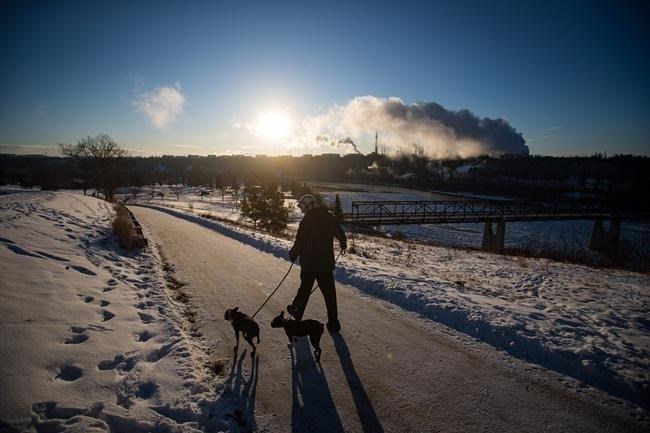
The extreme cold in Western Canada has sent temperatures plummeting across the region, with Edmonton set to record its coldest day in 50 years. A man walks his dogs in frigid weather at Rundle Park, in Edmonton, Wednesday, Dec. 25, 2019.
Image Credit: THE CANADIAN PRESS/Darryl Dyck
January 14, 2024 - 12:00 PM
The extreme cold in Western Canada has delayed air travel, set off traffic chaos in some regions and endangered lives with no relief coming until after the weekend.
Environment Canada said temperatures in Edmonton dropped to -37 C Friday morning and may hit -40 C overnight for the first time within city limits since January 1972.
"To put it into context, what is considered a normal temperature for the middle of January in the Edmonton area is highs of -8 and lows of -16," said Environment Canada meteorologist Samantha Mauti.
"For the next couple of days, we're seeing those temperatures in and around the -30 mark approaching -40, with wind chills well below."
Freezing weather and wintry road conditions have triggered a number of crashes in Alberta and British Columbia, as temperatures fell to -36 C in Calgary and -13 C with -24 wind chill in Vancouver on Friday.
The B.C. Ministry of Transportation DriveBC service said a multi-vehicle crash of about two dozen vehicles stopped commuter traffic on Thursday on Highway 91 in Richmond, south of Vancouver.
In Edmonton, Alberta Health Services said freezing temperatures caused an "air handling system issue" that has disrupted heating at the Royal Alexandra Hospital's emergency department, causing patients to be diverted to other hospitals for a time.
In Calgary, the deep freeze resulted in flight delays and cancellations at the airport, while a power outage on the city's light rail transit in the downtown core left commuters standing in the cold.
Adriana Unger with the Vancouver Airport Authority said they were seeing continued delays and cancellations on arriving flights as severe winter weather impacts Canada and the United States.
"Extreme cold temperatures in Alberta in particular are heavily impacting flights from Calgary and Edmonton."
Rescue crews said two skiers were saved from likely death after they became lost in the Fitzsimmons Creek area near the Whistler ski resort late Thursday as wind chill values dipped to around -50.
North Shore Rescue said on social media that a helicopter was used to hoist out the pair who were hypothermic with frozen feet.
"It is unlikely the skiers would have survived the night," said the North Shore Rescue post.
The blast of winter also struck Metro Vancouver, where White Rock recorded its lowest temperature for Jan. 12 at -14.4 C, beating the old mark of -11.7 C set in 1950.
Across the Vancouver region, three centimetres of snow caused havoc as it froze solid on unprepared roads Thursday before the evening commute.
Social media was filled with scenes of ice-sheened roads, stalled buses, sliding vehicles and traffic gridlock, both in the City of Vancouver and in surrounding communities.
A statement from Amy Sidwell, Vancouver's manager of street operations, said crews had been salting and brining major routes "for multiple days" prior to Thursday's snowfall but cannot compensate for the rapid temperature drop that created black ice on streets.
"Salt and brine assist with improving the condition on major routes ahead of snow accumulation but can’t entirely mitigate the challenging winter road conditions," Sidwell said.
B.C.'s Ministry of Transportation and Infrastructure said the province was "well prepared" for the snow, but there were still a number of incidents on Thursday.
"Inadequate tires were noted on some of the vehicles," the ministry said in a statement.
SkyTrain service on two lines through Metro Vancouver were delayed by the weather on Friday.
Tom Graham, a self-described weather junkie in Kananaskis, Alta., said he left his house to go to work around 8 a.m. and his diesel truck wouldn't start.
"It burns your face, whatever exposed skin you have," he said of the cold snap, adding he has kept his trips outdoors short despite being properly dressed.
"I have a full balaclava, microfleece — the one I am wearing is good to -25 — and then a full face helmet, goggles and we always travel in pairs," Graham said.
Kyle Brittain, a Calgary-based freelance journalist specializing in extreme weather, said temperatures were so cold that he was able to hammer a nail through a board using a banana.
"I got some bananas and I put them outside in the frigid temperatures for two or three hours and they froze solid," he said.
"I was pounding a nail through a board yesterday and it didn't break the banana, so it's the banana hammer."
Environment Canada said Friday that cold or arctic outflow warnings remain active across parts of Yukon and the Northwest Territories, much of B.C. and Manitoba, and all of Alberta and Saskatchewan.
The frigid arctic blast is expected to last through the weekend for the majority of B.C. and Alberta, while it will persist into early next week in Saskatchewan and Manitoba.
Environment Canada's Mauti said while temperatures may retreat from record lows after a few days, those expecting the balmy, abnormally warm weather seen in December may be disappointed.
"Into early next week, warmer temperatures are expected, but we're still looking at minus teens, which is well below what is considered normal for this time of year."
This report by The Canadian Press was first published Jan. 12, 2024.
News from © The Canadian Press, 2024